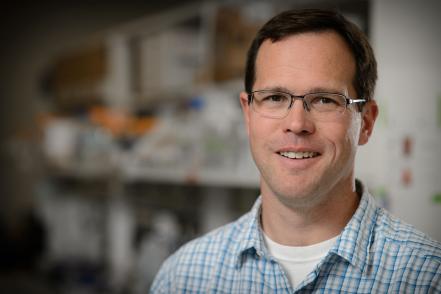When thinking about why breast cancer develops, it is critical to understand how normal development works. This is one of the driving factors in Eran Andrechek’s lab in the Michigan State University Department of Physiology, housed in the College of Natural Science.
Recently, the National Institutes of Health awarded him a five-year, $2.5 million grant to fund his research project of defining the role of the repressor E2F5 gene in mammary gland development. The gene is a part of the E2F family of transcription factors which is made up of activators and repressors. Andrechek said that while the role of the activator E2Fs is known to regulate mammary gland development, little is known of the role of the repressor E2Fs.
“I’m really curious to see how this transcription factor E2F5 is working,” said Andrechek, who was recently appointed as a full professor. “It’s relevant because when this transcription factor gets mis-regulated, the genes they control can transition to cancer.”
Andrechek said that preliminary data suggest that the transcription factor has a role in the both the development and function of the mammary gland in mice and humans.
“When we looked at mice that were lacking this transcription factor, they developed breast cancer,” he said. “So, how does this gene work during development? What are the genes it is controlling and when that process is disrupted, why does the mouse develop a tumor? Are other related genes trying to compensate for the loss of that gene? These are questions we will try and answer.”
Andrechek said the initial goal of the research project will be characterizing what loss of the E2F5 gene does to the developmental function but to figure out what genes it regulates will take three to five years. However, the Canadian native is optimistic about the process.
“I think it will be nice to see the students in the lab become independent scientists during that time period,” he said. “It will be rewarding to see them gain that confidence especially as they submit their first papers for publication.”
During this process he isn’t afraid of making mistakes. In fact, he says it’s a part of the learning process.
“Everybody makes mistakes especially as a grad student,” said Andrechek who joined MSU’s physiology faculty in 2009. “Mistakes are expected but it’s how you address those mistakes and your willingness to go forward and not be afraid to try the next experiment. It comes back to that intellectual curiosity we all have as researchers.”
At the end of the grant period, Andrechek says he hopes the findings will lead to further research on breast cancer.
“This will lay the groundwork and a foundation that helps us understand the developmental biology but there are implications for cancer biology, too,” he said. “But that’s another grant to follow up on.”
Research reported in this publication was supported by the Eunice Kennedy Shriver National Institute of Child Health & Human Development of the National Institutes of Health under Award Number R01HD104606. The content is solely the responsibility of the authors and does not necessarily represent the official views of the National Institutes of Health.
This story originally ran on the College of Natural Science website.
